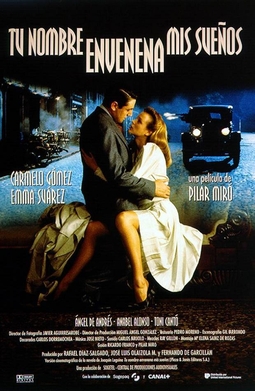Top Qs
Timeline
Chat
Perspective
Your Name Poisons My Dreams
1996 Spanish film From Wikipedia, the free encyclopedia
Remove ads
Your Name Poisons My Dreams (Spanish: Tu nombre envenena mis sueños) is a 1996 Spanish thriller film directed and co-written by Pilar Miró consisting of an adaptation of the novel Tu nombre envenena mis sueños by Joaquín Leguina. It stars Carmelo Gómez and Emma Suárez alongside Ángel de Andrés, Anabel Alonso and Toni Cantó.
Remove ads
Plot
The fiction, starting in 1942, is primarily set in post-Civil War, Francoist Madrid (1940s), focusing on the case pertaining the killings of some Falangists, conveyed from the point of view of inspector Ángel Barciela, the policeman taking over the investigation; there are however another two timelines corresponding to the 1950s, and to the actual war period.[1][2][3]
Cast
- Emma Suárez as Julia Buendía, a femme fatale hellbent on murdering fascists out of a desire for vengeance.[4][5][3]
- Carmelo Gómez as Ángel Barciela, the policeman taking on the investigation of the killings.[3]
- Ángel de Andrés as Paco Valduque.[5]
- Anabel Alonso as Lola.[5]
- Toni Cantó as Jaime Méndez, a former member of the Socialist Youth and former Julia's lover, killed by Fascists.[5][6]
- Héctor Colomé as Mario Montilla[7]
- Aitor Merino[2]
- Simón Andreu[2]
- Montserrat Carulla[2]
Remove ads
Production
A film adaptation of Joaquín Leguina's novel Tu nombre envenena mis sueños, the screenplay was penned by Ricardo Franco and Pilar Miró.[8] The film was produced by Sogetel/Central de Producciones Audiovisuales and it had the participation of Sogepaq and Canal Plus.[5] Javier Aguirresarobe was responsible for cinematography,[2] José Nieto for the music, and María Elena Sáinz de Rozas for film editing.[5] Rafael Díaz-Salgado, José Luis Olaizola and Fernando de Garcillán were credited as producers.[5]
Release
The film was presented at the 44th San Sebastián International Film Festival in September 1996,[9][5] the same year as The Dog in the Manger, another film directed by Miró,[10] who would die about a year later. Distributed by UIP,[5] it opened in Spanish theatres on 27 September 1996.[11]
Reception
David Rooney of Variety deemed the film to be a "mediocre period detective thriller", "more sleep-inducing than intoxicating".[5]
Augusto Martínez Torres of El País considered that the story would have probably been more interesting if it had focused on developing the (richer) personality of the woman, rather than on the point of view of the man.[2]
See also
References
Bibliography
Wikiwand - on
Seamless Wikipedia browsing. On steroids.
Remove ads

